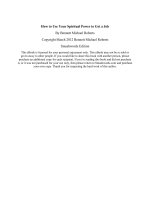A little but often - how to increase your vocabulary
Bạn đang xem bản rút gọn của tài liệu. Xem và tải ngay bản đầy đủ của tài liệu tại đây (78.66 KB, 3 trang )
A little but often (4) - How to increase your
vocabulary
Saturday, June 13, 2009 Posted by Dominic Cole
Much of the philosophy of this blog is that the best the way to prepare for IELTS is to take
care of your general English and not to focus solely on the exam. This is particularly
relevant in relation to learning vocabulary which is a key to all 4 papers. Here is another
"little but often" suggestion on how you should go about that learning process - this time
looking at learning the words you already know.
Learn the words you already know?
This no doubt sounds a strange suggestion, but to demonstrate what I mean, here's an
exercise for you. You know the word "practice" of course, so why bother learning it? To
show you, see if you can complete each of these sentences with a word based on "practice".
1. You can't do three jobs at once. That's totally ........ .
2. You're ........ old enough to drive. Why don't you think about saving up for lessons?
3. You need to ........ regularly if you want to improve
The solutions are added as a comment to this post. Did you get them all right? Well done if
you did, but don't worry too much if you didn't. I often take this task into class and rarely
do my students get 100%, they will know the base word, but they don't know all the
variations of it. This is quite normal for learners of English.
Word families - why they matter
What we are looking at here are word families: words that are related to each other. These
matter because research suggests that native speakers do not in fact use so many words and
that:
the 2000 most frequent word families of English make up 79.7% of the individual words
in any English text, the 3000 most frequent word families represent 84%, the 4000 most
frequent word families make up about 86.7%, and the 5000 most frequent word families
cover 88.6%. (click here if you want to read the research)
It's not that native speakers use so many words, rather they are able to use those words
much more flexibly than learners, as they know all the related words in the word family.
And in many ways it is these common words and their word families that learners of
English need to focus on - not the technical terms that are rarely used. Indeed, the academic
word list works on the same principle of word families.
How to learn word families
Look for common words
The first step is to understand this idea: that the words you need to notice and pay attention
to are the words you probably ignore as being too simple to learn. You recognise them, but
can you use them? This is a small but hugely important step - don't ignore familiar looking
words.
Learn to see patterns
The next step is of course to practise (note the spelling!). I will add, however, that you need
to practise regularly and intelligently for this work. By this I mean you want to learn to
notice patterns in different word families: to give you one example, all these words have
something in common:
• widen
• shorten
• lengthen
• broaden
Not only do they end in" -en", they are verbs. The point being that once you have seen this
a few times, you will learn how to make intelligent guesses about words you have not seen
or used before. This is necessary because you cannot "learn" all the words as there are
simple too many of them: only this week the millionth word in English was recorded!
A great site for practice
Flo Joe is a perfect "little but often" site, ideal for 15 minutes daily exercise. If you like,
take a look at my brief video introduction to it showing you how to navigate and use it.








![101 ways to promote your web site, eighth edition [electronic resource] filled with proven internet marketing tips, tools, techniques, and resources to increase your web site traffic](https://media.store123doc.com/images/document/14/y/ti/medium_e1umNeXW8E.jpg)
